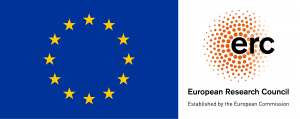Events
-
At the Conference “Nuovi media, nuovi miti”
Jenny Ponzo, Eleonora Chiais, Magdalena Maria Kubas and Francesco Galofaro are participating in the conference “Nuovi media, nuovi miti”, organized by CIRCe, that will take place at the Polo del […]
-
At Compalit conference 2021
Magdalena Maria Kubas is participating in the conference “Con i buoni sentimenti si fanno brutti libri? Etiche, estetiche e problemi della rappresentazione”, organized by Compalit (Associazione di teoria e storia […]
-
At MOD conference
Magdalena Maria Kubas is participating in the MOD conference (Società Italiana per lo Studio della modernità letteraria) on the theme Contronarrazioni. Il racconto del potere nella modernità letteraria, that will be held at the University La Sapienza […]
-
At The Challange of Contemporary Religion
Jenny Ponzo and Francesco Galofaro are participating in the cicle of conferences “The Challange of Contemporary Religion”, that will be held at the University of Siena. They will talk about […]
-
At workshop “Religion as an Object of Historical and Social Scientific Study: Global Perspectives”
Our team member Marco Papasidero is participating in the international workshop “Religion as an Object of Historical and Social Scientific Study: Global Perspectives”, that will be held at the University […]
-
At “Language, Economics, Performativity” international conference
Our team member Francesco Galofaro is participating in the international conference Language, Economics, Performativity for the Centennial of Ferruccio Rossi-Landi’s birth (1921-2021). The event will take place at the University […]
-
At the retrospective Histoire(s) du Cinéma
PI Jenny Ponzo is participating in the retrospective Histoire(s) du Cinéma, organized by the Cinema Museum. She, together with Silvio Alovisio, historian of the cinema, will introduce the film by Carl Th. […]
-
At III Encuentro Internacional de Investigadores en Ciencias de las Religiones (EICR)
Our team members Maria Magdalena Kubas and Marco Papasidero are participating in the III Encuentro Internacional de Investigadores en Ciencias de las Religiones (EICR), that will take place in Madrid […]
-
At Circolo della Stampa
Our PI Jenny Ponzo is participating in the roundtable “Le parole della nuova spiritualità”, with Stefania Palmisano, Nicola Pannofino, Alberto Sinigaglia. The event will take place at the Circolo della […]
-
At Alma Dante 2021
Our team member Magdalena Maria Kubas is participating in the third International Dante Conference “Alma Dante 2021”, at the University of Bologna, from 15 to 18 September 2021. Her speech […]
What is NeMoSanctI?

NeMoSanctI is a research project carried out at the University of Turin. It studies how models of sanctity have changed after the Second Vatican Council. To this end, it applies a pioneering methodology based on semiotic theory to a wide corpus of normative, judicial, and narrative texts.
This project has received funding from the European Research Council (ERC) under the European Union’s Horizon 2020 research and innovation programme (grant agreement No 757314).
Categories
- Book Presentation (3)
- Book Presentation (4)
- Call for Papers (3)
- Coronavirus (2)
- Events (126)
- Forma Sanctitatis (4)
- News (84)
- Press Review (14)
- Public engagement (38)
- Publications (60)
- Research (133)
- Semiotics of Religion (130)
- Uncategorized (16)
- Video (15)
- Website (6)
Recent Posts
- Book – J. Ponzo, S. Stano (eds.), I media e le icone culturali (Saggi di Lexia, 2024)
- Third meeting of “Altri Mondi, Altri Dei” series at Mufant.
- At the NYU-Roma Tre Permanent Global Seminar “Religious Diversity in Italian Urban History”
- Warning: “Nuovi mondi, nuovi dei” on the newspaper “La Stampa”
- “Santità convergente”: NeMoSanctI’s seminar at the University of Turin
